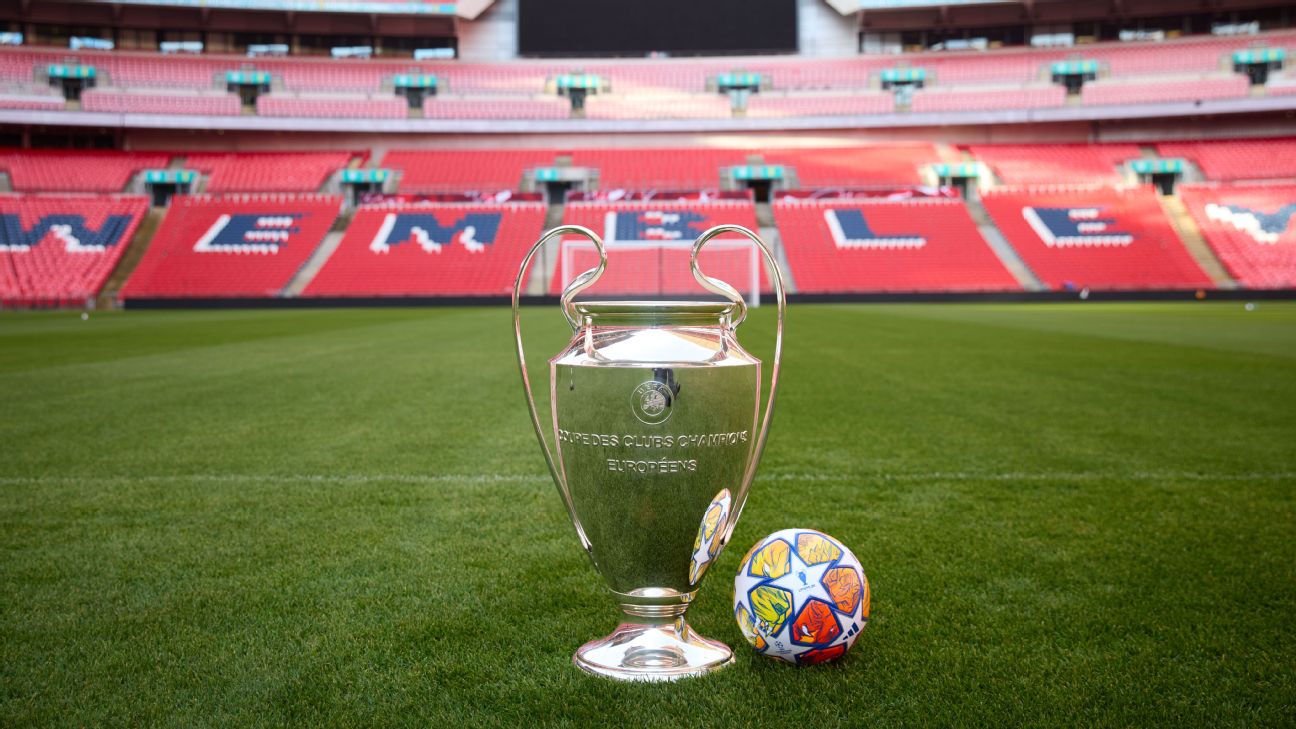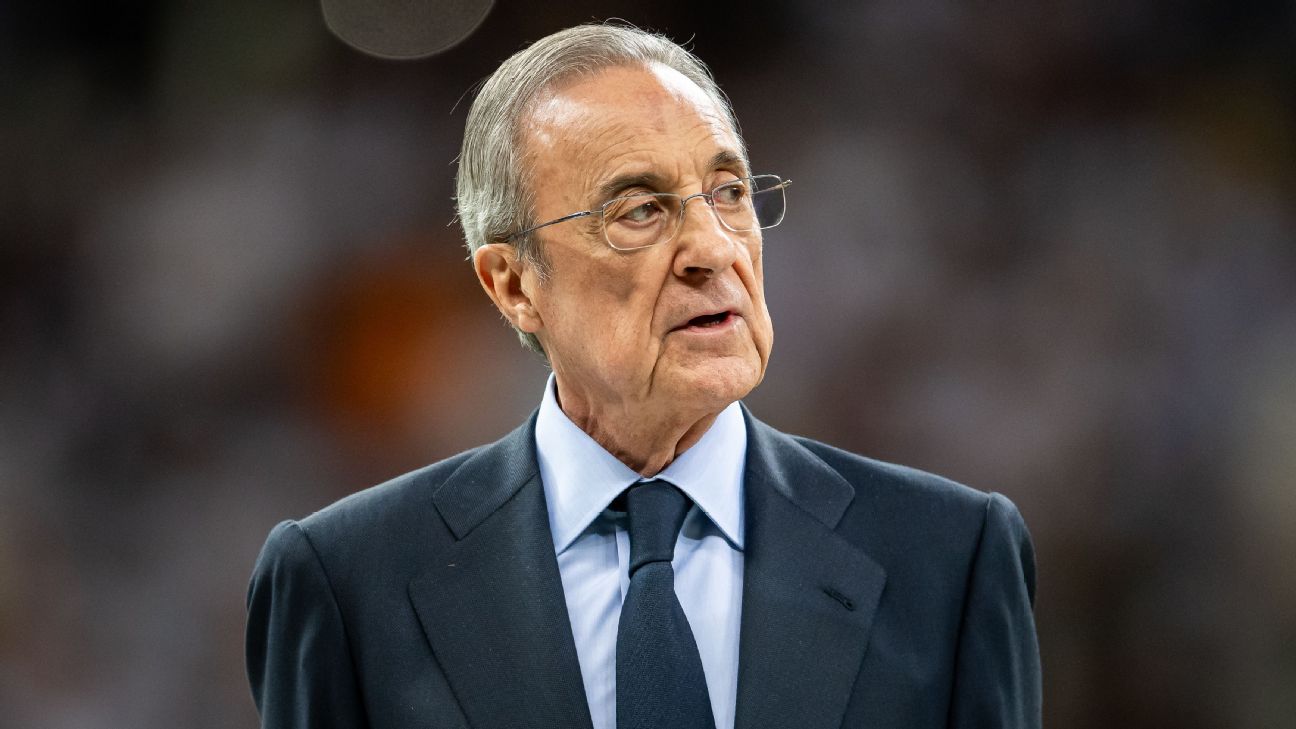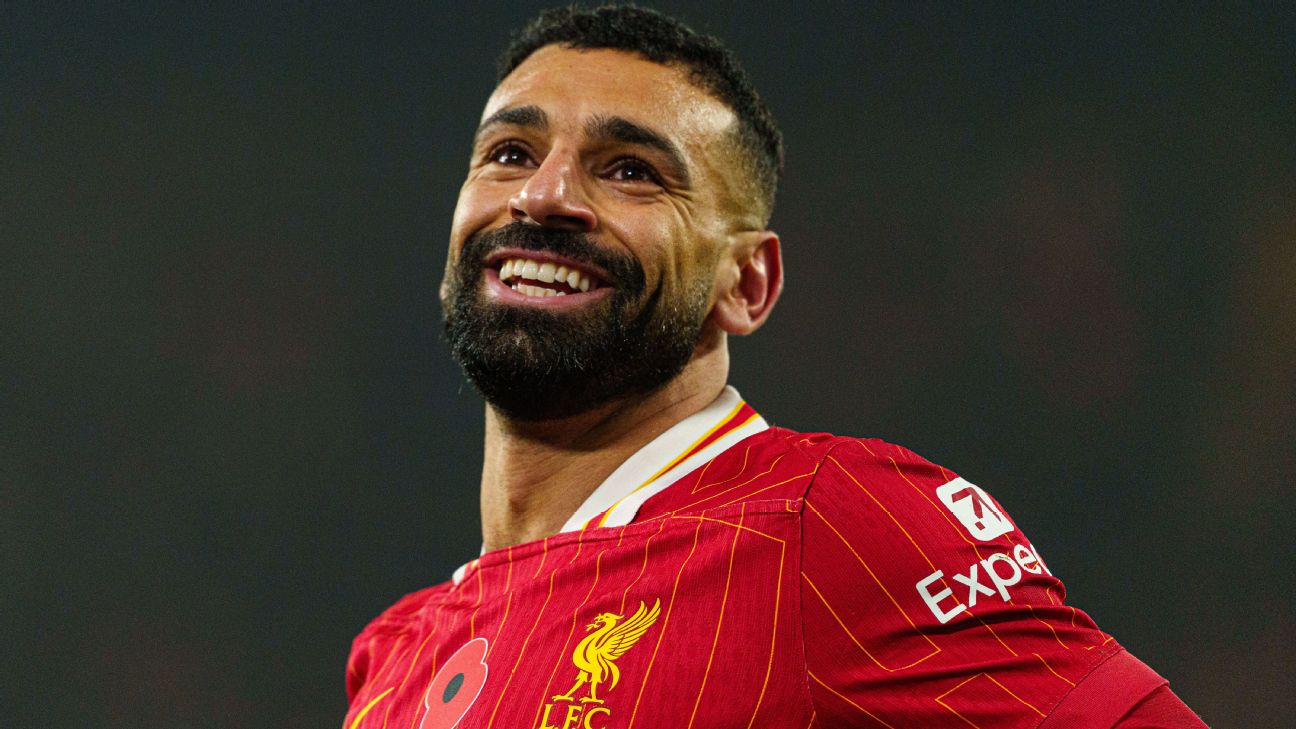The Champions League knockouts are finally here, and that can only mean one thing …
It’s time for our third annual pseudoscientific attempt at using nothing but cold, hard data to predict who is going to win the Champions League.
Like we’ve done the past two years, we’re going to consider the previous 13 winners of the tournament, and then figure out which team in the current field looks the most like those prior champions. Rather than doing anything fancy like creating an algorithm, running a regression or deriving AI-calculated insights via machine learning powered by the energy at the core of the sun, we’re just going to make our way down a list of (mostly) simple statistics and eliminate whatever teams don’t meet the bare-minimum criteria, one by one.
Who looks the most like a Champions League winner this season? Let’s find out.
Note: All stats come courtesy of Stats Perform, unless otherwise noted, and are based on domestic competition only.
Champions League measurement No. 1: Scoring goals
Over the past 13 seasons, the teams that win the Champions League have been — on average — elite attacking sides. The average number of goals scored by all the European champs since 2011 is 2.5 per match. Over a 38-game season, that comes out to a cool 95 goals. For some context: Across Europe’s “Big Five” top leagues last season, not one team even reached the 95-goal mark.
Of course, we’re talking about the average here, so we’d expect a good chunk of the past champs to fall below the 2.5-goal mark too. The furthest below: Chelsea’s 2021 championship side, which averaged 1.5 goals per game and somehow won the European Cup with a starting front three of Mason Mount, Kai Havertz, and Timo Werner — none of whom is still with the club and none of whom has exactly lit the world on fire in the years since, either. The 2020-21 season still feels like a collective fever dream.
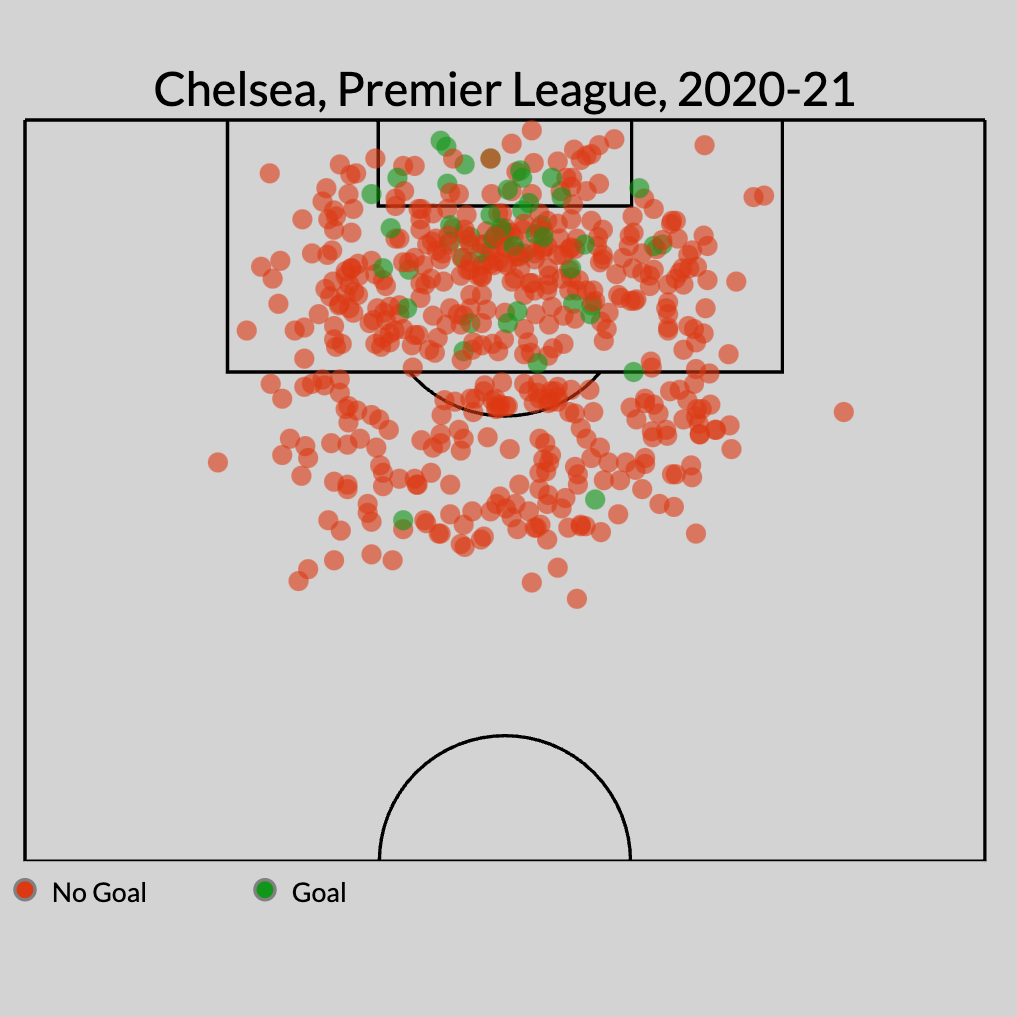
Only three teams in this year’s field fail to hit that 1.5-goal mark. The first two are not so surprising: Lazio, who currently sit in eighth place in Serie A, and Real Sociedad, who are just one spot better in LaLiga. The third side, however, is Napoli, a team that not only won Serie A last season but won our Champions League prediction last season as part of this same statistical exercise. Although both star attackers — Khvicha Kvaratskhelia and Victor Osimhen — opted to stay in Naples for another season, the club’s managerial upheaval seems to have sucked much of the offensive energy out of last season’s European darlings.
Teams eliminated: Lazio, Napoli, Real Sociedad
Teams remaining: Manchester City, Bayern Munich, Arsenal, Real Madrid, Barcelona, PSG, Inter Milan, Atletico Madrid, Borussia Dortmund, RB Leipzig, FC Porto, PSV, FC Copenhagen
Measurement No. 2: Preventing goals
While there’s a good deal of variation between the attacking outputs of the previous winners — multiple sides averaged as much as 2.9 goals per game — there’s not as much of a gap between the champs’ defensive records.
On the top end, we have Bayern Munich’s sterling mark of 0.5 goals against per game in 2012-13. The least solid winners, defensively, were Real Madrid in 2017-18 and Chelsea in 2011-12, who each conceded 1.2 goals per game.
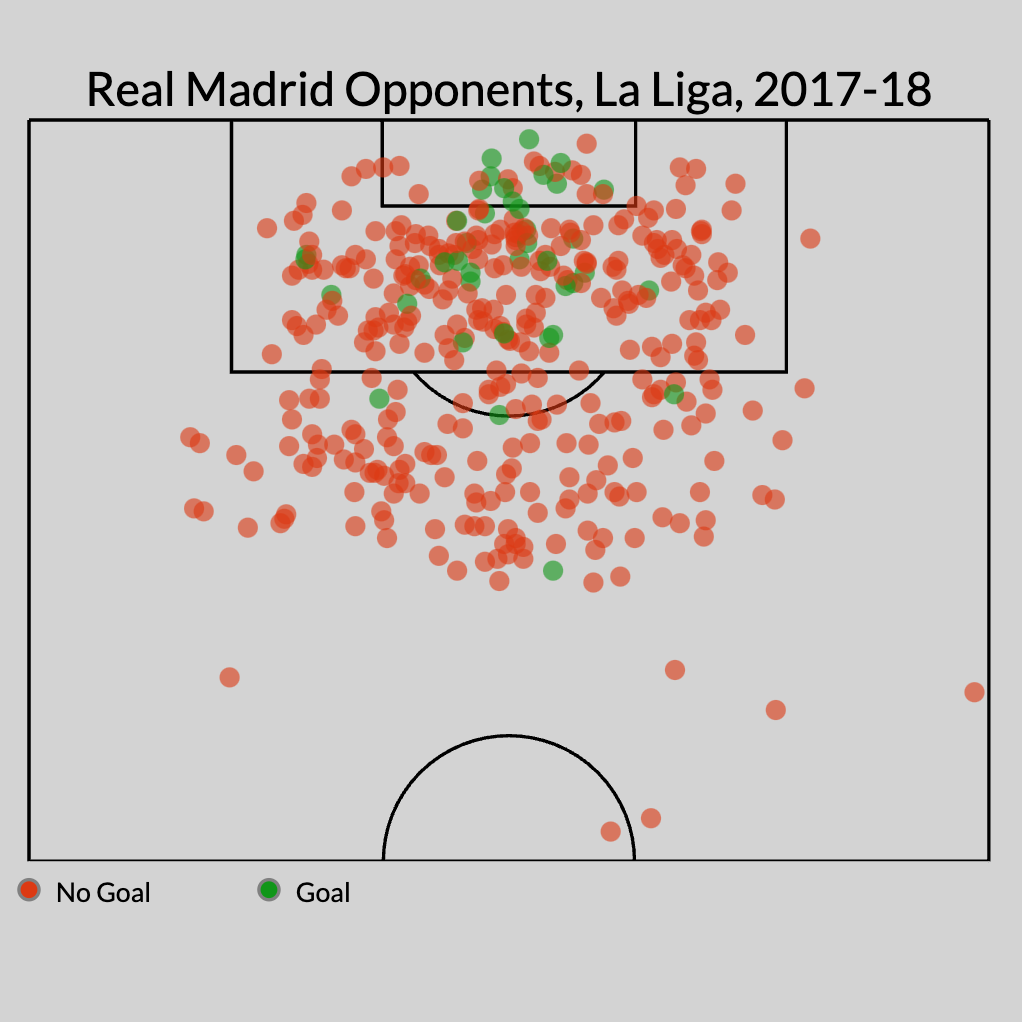
The difference in goals scored between the best and worst winners is 1.4 per game — or double the distance between the worst and best defenses (0.7 per game). The way to think about this, then, is that at the top level of European soccer, there’s much more ground to be made up by improving your attack as opposed to solidifying your defense.
That is, unless you’re Barcelona, Borussia Dortmund, RB Leipzig or FC Copenhagen.
The Spanish powerhouse, as I wrote about a few weeks ago, went from being arguably the greatest defensive team in the history of LaLiga last season to a mid-table defensive outfit this season.
Pretty much all of Barcelona’s struggles this season come down to their inability to prevent goals. Same goes for Dortmund and Leipzig, who are living up to the Bundesliga stereotypes. Copenhagen, meanwhile, have the longest odds of any team in the round of 16. Part of that is because they’re playing Manchester City, and part of is that they’re allowing more than 1.2 goals per game in the Danish league.
Teams eliminated: Barcelona, Borussia Dortmund, RB Leipzig, FC Copenhagen
Teams remaining: Manchester City, Bayern Munich, Arsenal, Real Madrid, PSG, Inter Milan, Atletico Madrid, FC Porto, PSV
Measurement No. 3: Controlling field tilt
There’s no one style that guarantees Champions League success, but it does seem like you need to at least be able to keep the ball away from your goal and near your opponent’s goal for sustained periods of time to last all the way until the final. Sitting back and countering might win you a round or two, but the Champions League knockout contenders are too talented to allow opponents to pin them into their defensive third and fend off chance after chance, round after round.
As such, the average winner has controlled 64% of the final-third possession in their matches. We’ll call it “field tilt” from here on out: It’s simply your standard possession statistic but adjusted to only include passes completed in either attacking third.
The highs, unsurprisingly, come from Barcelona’s two past winners: 74% for Luis Enrique’s team in 2014-15 and 73.1% for Pep Guardiola’s 2010-11 squad. The low end, once again, is provided by Chelsea; although they finished in sixth place in the Premier League in 2012, they still managed a field tilt of 56.1%.
And so we must say goodbye to round-of-16 opponents Inter Milan (55.1%) and Atletico Madrid (50.2%).
Inter, in particular, are an interesting case. Despite not controlling territory too aggressively in Serie A, they’ve scored 55 goals and conceded 12 — and that’s backed up by elite underlying numbers too. Their round-of-16 matchup with Atletico Madrid should make for an interesting test: Inter are playing against perhaps the only team in the field who will encourage them to have the majority of the ball.
Teams eliminated: Inter Milan, Atletico Madrid
Teams remaining: Manchester City, Bayern Munich, Arsenal, Real Madrid, PSG, FC Porto, PSV
Measurement No. 4: Pressing
In keeping with the previous section, it’s really hard to win the Champions League if you’re not hard to pass against. If you’re not hard to pass against, the best passing teams in the world are just going to gradually turn the screws, wear you out by forcing you to chase the ball around and pin you into your own penalty area.
The worst pressing team to win one of the previous 13 European Cups was the Real Madrid side of two seasons ago. They allowed opponents to complete 83% of their passes, and we saw Madrid struggle in that regard throughout the knockout stages. They went on arguably the most impressive run the competition has ever seen, taking down PSG then defending champs Chelsea then Manchester City and Liverpool when both were truly at the height of their powers.
If you strip away the jerseys — the names on the front and the back — then it really was one of the greatest-ever underdog runs. In the knockout rounds, Madrid allowed opponents to complete 88% of their passes, and Madrid conceded 135 shots while attempting 71. It was a once-in-a-lifetime run of good bounces and high-leverage execution; it’s just that it all happened to go in favor of the most successful team in the history of the competition.
Were Madrid to win again this season, it seems like they might need to try to follow that model once more. They’re allowing opponents to complete 85% of their passes, which isn’t just high for a Champions League winner. It’s the seventh-highest mark for any team in Europe’s Big Five leagues.
Teams eliminated: Real Madrid
Teams remaining: Manchester City, Bayern Munich, Arsenal, PSG, FC Porto, PSV
Measurement No. 5: Pace and possession
There seems to be a sweet spot here: You don’t want your games to be too frantic, and you don’t want them to be too deliberate, either. At least, there seemed to be a sweet spot.
For years, Manchester City proved the latter point, as they continued to be the favorite to win the whole thing and continued to, you know, not win the whole thing. The only area where they were a statistical outlier was in how slowly they had begun to play. Before last season, no team had won the Champions League over the past 13 seasons without averaging at least 84.1 possessions per game, and that was Real Madrid the season prior. The campaign before that, Chelsea had established what was then the new low at 90.4 possessions per game.
Then, of course, Man City finally won the Champions League, with a team that averaged 78.5 possessions per game. This possessions number really just indicates how willing a team is to play in transition and how much they’re able to force the game into transition. To the shock of absolutely nobody, Liverpool in 2018-19 and Bayern Munich the season after registered the high marks of possessions per game among winners at 99.1 for Jurgen Klopp’s team then 99.8 for Hansi Flick’s squad.
Taken together, there’s an intriguing and abrupt change in trend: Liverpool conquered Europe by being comfortable with the ball changing hands (feet?) left and right … then so did Bayern Munich. However, the three winners since have progressively lowered the bottom threshold for number of possessions for a Champions League winner. Is slow soccer now the way to win? Or will there be a reaction in the other direction?
Whatever the answer, we’re going to create an upper and lower bound then eliminate anyone on either side. That means goodbye to PSV, whose matches in the Eredivisie have featured 100.6 possessions per game this season, and so long to Man City, who have been somehow even more deliberate in the Premier League than ever before, down to 75.5 possessions per game — the lowest mark of any team in the Big Five leagues.
More importantly, that allows me to say what I say every year: Manchester City are favorites to win the Champions League, and the most likely outcome is still that a team other than Manchester City wins the Champions League.
While we’re here, FC Porto also get cut, for similar reasons to PSV. No winner has completed fewer than 84.5% of their passes, and the Portuguese side is down at 84%.
Teams eliminated: Manchester City, PSV, FC Porto
Teams remaining: Bayern Munich, Arsenal, PSG
Measurement No. 6: Frequency of crossing the ball
My favorite part of the Champions League is how it smashes together dominant teams who have never played against each other. Bayern Munich and PSG are expected to control the ball in every domestic game they play, but what happens when they come up against an equally talented opponent who won’t let them dominate possession?
These teams always have the ball — then, all of a sudden, in the only games that really matter to their clubs, they suddenly can’t always have it. In a lot of ways, the Champions League forces the best teams in the world to play a different version of the sport than they’re used to — and I think that’s why it produces so many shock results and unexpected blowouts.
The best-suited teams for European success, then, are the ones that can operate across all of the different modes comfortably: They can press, they can defend deep at times, they can counterattack, they can create from settled possession, they don’t waste their set plays and they’re not afraid to whip in a low-probability cross here and there.
Among the past winners, Chelsea in 2012 crossed at the highest rate, with 19.7% of their final-third passes being crosses. The bottom end at 8.7% is, unsurprisingly, the 2010-11 Barcelona team that featured a 5-foot-7 Lionel Messi as the nominal center forward.
That Barcelona team, of course, had the greatest player of all time, maybe the greatest coach of all time and perhaps the greatest midfield of all time. While Paris Saint-Germain currently might have the best player in the world in Kylian Mbappé and a manager who has won the Champions League before in Enrique, their midfield comes nowhere near the levels of Guardiola’s Barca or even Enrique’s Barca. Despite that, PSG are crossing the ball with just 8.1% of their final-third passes in Ligue 1. If that approach doesn’t work, then what’s Plan B?
Teams eliminated: PSG
Teams remaining: Bayern Munich, Arsenal
Measurement No. 7: Going long
One thing that every Champions League winner has in common: at least one player with field-stretching passing range. Just to name a few: Barcelona had Xavi, Dani Alves and Gerard Pique. Real Madrid had Luka Modric, Toni Kroos and Marcelo. Bayern Munich had Bastian Schweinsteiger, Philipp Lahm, Joshua Kimmich and Thiago. Liverpool had Virgil van Dijk and Trent Alexander-Arnold. Chelsea had David Luiz, Thiago Silva and Jorginho. Manchester City have Rodri and Kevin De Bruyne.
Every team that has won the Champions League over the past 13 years has completed at least 50% of their long passes, defined as being more than 35 yards. Liverpool, in part due to their aggressive approach, are found at the bottom end with 51.8% of their passes completed. The top end is marked by that 2010-11 Barcelona team; yes, they could complete long balls too, at an absurdly high rate of 74.8%.
While this season’s Arsenal stand out in just about every other statistical area possible, they just can’t play the ball long. Or at least, they don’t yet.
While they’re filled with fantastic short-space passers, the Gunners really don’t have that kind of field-stretching passer that we’ve seen from every team that has lifted the European Cup over the past 13 years. This season, the Gunners have completed just 47.4% of their long passes. They also only attempt 1.9 switches of play per match, the lowest number of any of the teams in the field other than Copenhagen, whom we don’t have advanced data for.
Will Arsenal be able to win four consecutive matchups against the best teams in the world without consistently stressing their opponents vertically or horizontally? They’d be the first. So, I’d expect a heavy dose of Jorginho (and his passing ability) in the knockout rounds, just like we saw in Arsenal’s dominant win over Liverpool on Feb. 4.
However, we’re working off past data and not projections concerning a 32-year-old with just five league starts this season. So, congratulations to Bayern Munich, the 2024 UEFA Champions League champions!
I kid, of course, and it does seem like a strange pick given that they’re not even in first place in their own league and that they just got trucked by first-place Bayer Leverkusen over the weekend. But Bayern are so much more talented and well-resourced than the rest of the Bundesliga, and the league itself is a massive stylistic outlier.
So, there’s very little connection between what Bayern needs to do to win their own league and what Bayern needs to do to win the Champions League. However, their style has changed significantly since Thomas Tuchel took over as manager last season: It isn’t as frantic and as high-paced as under Julian Nagelsmann. And in Germany, well, it’s just simply not as good.
But we’ve already seen Tuchel reach the Champions League final then win this thing — with different teams, in consecutive seasons — by forcing his players into a much more deliberate approach. Maybe, then, they just needed to take a step back at home in order to take a step forward in Europe. With their 11-season Bundesliga winning streak looking like it might finally come to an end, Tuchel had better hope that’s the case.
